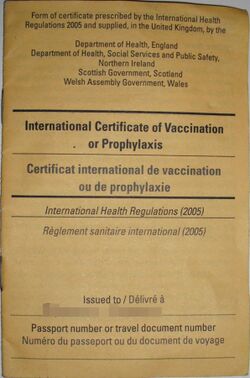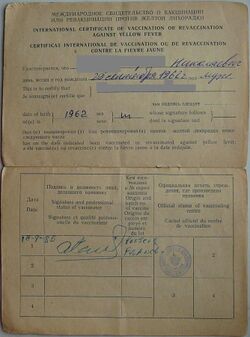Medicine:Carte Jaune
The Carte Jaune or Yellow Card is an international certificate of vaccination (ICV). It is issued by the World Health Organization. It is recognised internationally and may be required for entry to certain countries where there are increased health risks for travellers. The Yellow Card should be kept in the holder's passport, as it is a medical passport of sorts.
Note that the example shown here is the American version of the WHO-ICV, issued by U.S. Department of Health and Human Services. It is available through the Government Printing Office. The original ICV printed and distributed by WHO is found in two versions: 1) English - French (bilingual) or 2) English - French - Arabic (trilingual). These WHO versions do not have pages to show medical contraindication to vaccination, personal health history, state of health, medical treatments, known sensitivities, medications taken regularly, and ophthalmic information. The WHO versions are available from the WHO Bookstore, and they can be ordered in quantities of 5,000 or more, for overprint. The Yellow Fever section is the most important part of the certificate. Other variants of the Yellow Fever certificate are valid only if the card follows the standardized format, and has been officially approved by WHO.
There has been a revision in the format, title and the rules on the 2007 issue. It is now called, "International Certificate of Vaccination or Prophylaxis", and the overprint service is no longer available.
Filling out the card
The vaccine certificate has columns to fill out with dates, nature of vaccine, dose, and physician's signatures. The date must be in the order of DD/MM/YYYY. It is common to see the physician complete the certificate using product name alone, and not indicate the "nature" of the vaccine. In order to make the certificate "international", it is strongly advised that the physician also mentions this (i.e. "Havrix <hepatitis A> 1440 El.U." instead of "Havrix" alone), since the brand name may vary in different parts of the world. It will also help if this is accompanied with the lot number, since the number and the signature together will improve the authenticity of the certificate, as well as reporting when unexpected accidents or illnesses happen. If the physician is willing to put his/her practice address and telephone information, it is best practice that the address also include the country name, and the phone number starting with the country code. The physician must understand that the card is used internationally and not many people outside of a country would know the American or other state names, country codes, and accreditations.
Additionally, for those medical professionals from countries not used to sign and indicate their own name, but only clarify the institute name and a stamp, it is advisable that recipients (patients) to request a signature and name on the certificate, as this may alter the relevance of it.
The International Certificate of Vaccination (ICV) was revised in 2007 and approved by http://WHO.int to include not just the vaccination card but also the additional sections listed in this article. If your physician does not have a supply of the International Certificate of Vaccination, they may be ordered directly from the Government Printing Office at http://bookstore.gpo.gov/catalog/health-benefits/immunization-vaccination/vaccination-forms or you might conduct a search on form "CDC 731" to find other vendors.
Availability of vaccinations
A typical doctor's office will not keep travel vaccinations in stock, so it is best to talk to your primary care physician about where to receive travel medications. For travel to developing countries, many vaccinations may be required, and it is best to refer to either the World Health Organization (WHO) [1], Centres for Disease Control and Prevention (CDC)[2] or other national or international health websites for current requirements. One must be aware that not all vaccines for preventable diseases are listed as recommendations, due to the approval status in that country the information originates (i.e. Cholera (inactivated oral vaccine) in the United States of America). It is certainly wise for one to research information from other countries of the languages one understands, and that the information derives from reliable authorities and scientific/medical evidence and statistics.
Vaccines
Mandatory
Currently, the only universally required vaccination is yellow fever. In countries where it is not required for entry, it may be a good idea to get the vaccination if travelling to endemic zones. After the primary immunisation, boosters are required in ten-year intervals. One must receive this vaccination at least ten days prior to travel. For some countries, the cholera vaccine may be required despite the fact that the World Health Organization does not state this in their regulations. To avoid being quarantined or denied entry, check the entry requirements for the country by contacting the embassy or consulate, especially if there is a current cholera outbreak. Because it is not a universally required vaccination, one may need a separate cholera certificate or a physician's signed statement saying that the vaccine is contraindicated for certain health conditions.
On the Yellow Card, the International Certificate of Vaccination or Revaccination Against Yellow Fever (Certificat International de Vaccination ou de Revaccination Contre la Fièvre Jaune) is located on the first two pages (in the original WHO version, 3rd and 4th pages) inside of the card. The certificate requires the date of vaccination, the signature and professional status of the vaccinator (signature et titre du vaccinateur), the manufacturer and batch number of the vaccine (fabricant du vaccin et numéro du lot), and the official stamp of the vaccinating centre (cachet officiel du centre vaccination). In order for the certificate to be valid, the vaccination centre must be approved by the World Health Organization (WHO).
Routine
Citizens of developed countries have most likely received their initial doses of the following:
- tetanus and diphtheria (Td)
- pertussis (whooping cough)
- measles, mumps and rubella (MMR)
- polio
Travellers will most likely need to receive boosters of these, as many people in North America do not regularly update their shots and may be susceptible to these diseases, particularly measles, polio and pertussis [3].
For these additional vaccinations, there is another page in the Yellow Card that is located on the inside of the book under the traveller's information. Required information for these vaccinations includes the date of vaccination, the vaccine/prophylactic drug (vaccin/médicament prophylactique), the dosage, and the physician's signature (signature du médecin). Immediately below this table is a form for medical contraindications to vaccinations (contre-indictation médicale à la vaccination). This form must include the reason why the person is medically contraindicated for a particular vaccine.
Others
Although the following are not required for entry to any country, they may be recommended dependent on destination, purpose of travel, duration of travel, or level of anticipated contact with locals.
- meningococcal meningitis
- Japanese encephalitis
- hepatitis B
- hepatitis A
- typhoid
- cholera (oral, inactivated)
- tick-borne encephalitis
In addition to these, it is recommended that travellers receive medication for traveller's diarrhoea because of the risk of water-borne pathogens. For those travelling to endemic areas, malaria chemoprophylaxis are recommended; both of these can be prescribed by a physician or nurse practitioner.
Personal health history
The centre of the card has a very important section about the health of the traveller.Although not mandatory to fill out, in case of emergency, it may be helpful for the physician who will treat the traveller. The information in this includes:
- Name and sex of the traveller
- Date of birth
- Name, address and phone number of a person to notify in case of emergency (nom, adresse et numéro de télephone de la personne à avertir en cas d'urgence)
- Blood group and Rh type (groupe sanguine et type Rh)
- Name and address of physician (nom et addresse du médecin)
- State of health, medical treatments or known sensitivities (état de santé, traitments médicaux ou sensibilités connues)
For people who have allergic reactions to things like eggs and latex, it is very important to fill out the last section.
Medications taken regularly
For those who take regular medications such as insulin and digoxin (digitalis), the section of medications taken regularly (médicaments pris régulièrement) may be required to bring said medications into foreign countries. There are five required sections of this table:
- health problem (problème de santé)
- generic and trade names of medication (noms génériques et commerciaux du médicament)
- medication dosage (dosage du médicament)
- physician's remarks (remarques du médecin)
- physician's signature (signature du médecin)
Ophthalmic information
People who wear glasses should have their ophthalmologist fill out the section for prescription glasses in case damage occurs to them. Just as on normal eye prescriptions, there should be information about each eye (ocular dexter/oculaire droit, ocular sinister/oculaire gauche) along with information about the sphere (sphère), cylinder (cylindre), axis (axe), prism (prisme) and base. Any comments and additions to this prescription should be noted, as should information regarding astigmatism (standard axis notation/selon schéma)
See also
- electronic identification
External links



